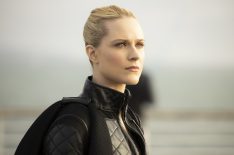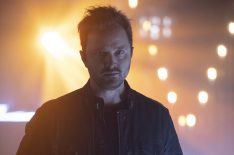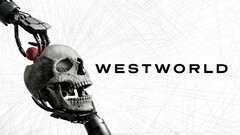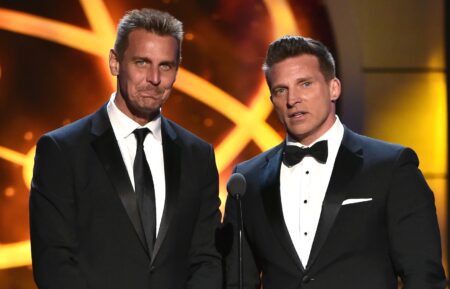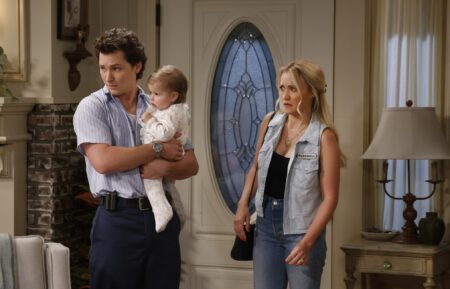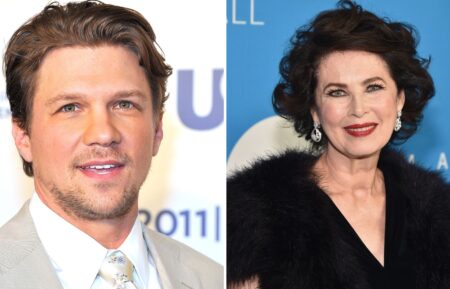‘Westworld’ Returns With a Shiny New Look in Season 3 Premiere (RECAP)
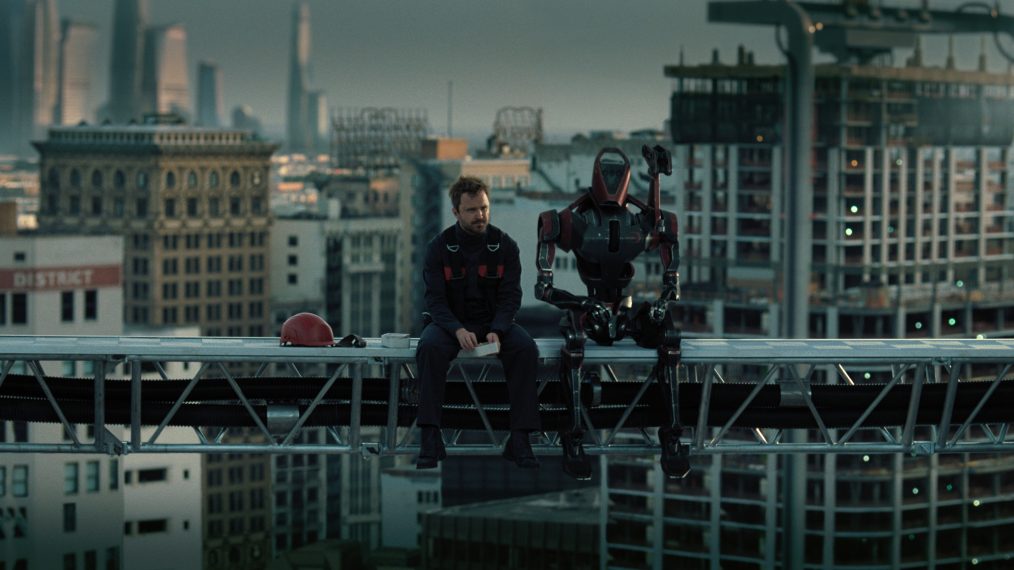
Spoiler Alert
[Spoiler Alert: This recap contains spoilers from Episode 1 of Westworld Season 3, “Parce Domine”]
If you switched on HBO to watch Westworld tonight without having seen any of the Season 3 previews, you could easily be mistaken into thinking you’d turned on the wrong channel. Where are all the cowboys?! Well, Westworld has left the theme park and entered the real world, and that means an entirely new look. Gone are the rough and rugged ranchers, the moonshine swilling highwaymen, and the horseback riding gunslingers. The show has traded in the dusky desert plains for cold, dystopian cityscapes — a futuristic world of sleek skyscrapers, flying cars, and voice-activated everything.
Watch for a few minutes, though, and you’ll soon realize that, despite this change in aesthetic, Westworld is still Westworld, and by that, I mean still plagued with the same flaws that made the second season such a slog. An overabundance of technobabble? Check. Tin-eared dialogue? Yep. A continued reliance on needlessly complex narratives at the expense of character depth? You betcha! I was hoping the show would have fixed some of these problems heading into season 3, but this premiere does little to alleviate my concerns. The stories remain split across multiple timelines (or at least various locations), the characters are still frustratingly cryptic, and the tone is as humorless as ever.
That said, I do appreciate the show shaking up its appearance. The Dark City vibes at least give the impression of change, even if what’s beneath the surface is the same circuitry and wires. It’s gone from robotic western to sci-fi spy thriller, with Dolores (Evan Rachel Wood) in the role of the highly-skilled undercover agent — sort of Alias meets Black Mirror. And while I’m not sure I’m on board for a full season of robot spy drama, there are certainly some fun sequences in the premiere, mostly involving Dolores rampaging through the city, getting into high-speed chases, or mercilessly disposing of bad guys.
Thematically, the show hasn’t changed. You don’t need to be a master in reading subtext to see the real world is an echo of Westworld. This is seen through the eyes of a brand new character, Aaron Paul’s Caleb, an ex-soldier-turned-construction-worker living in Los Angeles and struggling to make ends meet. Caleb is a human (although you never really know with this show) and, therefore, seemingly has free will to make his own choices and carve his own path in life. But, much like the hosts of Westworld, Caleb is stuck in a loop — the shot of him waking up each morning with the sun on his face a clear nod to the start of Dolores’ narrative loop back in the park.
Caleb lives in a detached world that has become increasingly reliant on technology. Automation has made jobs scarce, forcing him to become a slave to the gig economy. He resorts to petty crimes from a sort of live-action Grand Theft Auto app called RICO, which allows its users to select various criminal missions in and around the city, such as stealing ATM machines or subduing drug-crazed sex slaves. This is one of the more intriguing parts of the episode, especially as it allows for cameos from Lena Waithe and former NFL running back Marshawn Lynch, who join Caleb on a couple of these unlawful enterprises.
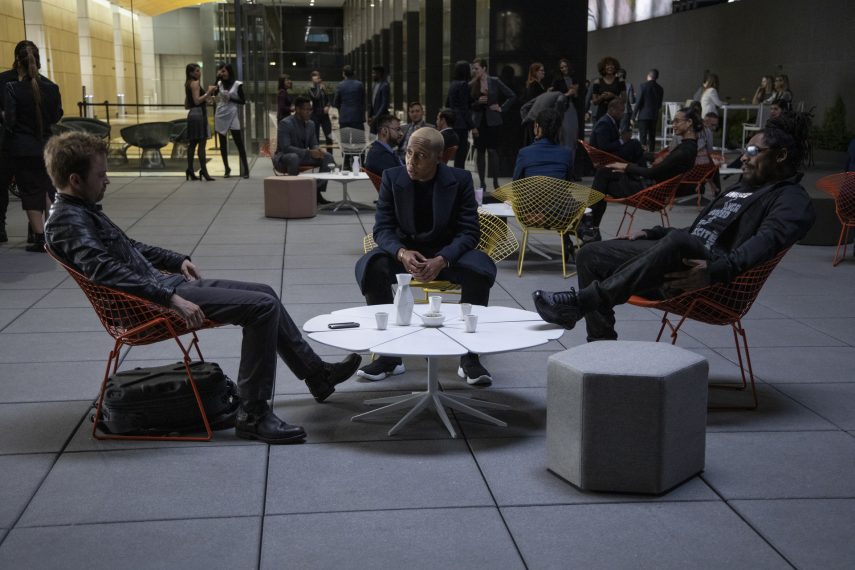
HBO
But Caleb is looking for something beyond a quick cash grab. What he’s really searching for is a connection — and not the wi-fi kind. This is a man haunted by the violent memories of war, and his government-mandated therapy sessions don’t seem to be helping. Throughout the episode, Caleb chats on the phone to his friend Francis (Kid Cudi), a fellow soldier who fought alongside him in this unspecified war. Francis acts as a guiding voice, a friend who comforts and encourages Caleb through the tough times. But, as we discover towards the end of the episode, Phone Francis is not real. The real Francis died in Caleb’s arms out on the field. The voice on the phone is just a ghost in the machine, a man’s memories coded into something merely resembling Caleb’s comrade.
If this season is to succeed, then I think it will be dependent on what happens between Caleb and Dolores, who wind up crossing paths at the conclusion to this episode. Not only are Paul and Wood top tier actors who can elevate substandard material through performance, but there is potential in this relationship for real character growth, the kind that Westworld so frequently ignores. And I think that is desperately needed, especially for Dolores, who has become less and less multilayered as the series has gone on.
Even though she’s a host, Dolores’ journey to sentience in season 1 was not only gripping but emotionally affecting. She was a character of conflictions, pulled between her coding as both a damsel in distress and a coldblooded killer. Becoming self-aware revealed a character of great heart and intelligence with a desire for justice. But towards the end of the second season, those layers were stripped away, leaving just the unrelenting murder machine, which can be thrilling in its own way, but way less relatable. And callous killer is pretty much the same mode Dolores is in now.
Remember, at the end of last season, Dolores led a host uprising, slew a bunch of Delos big-wigs, and left the park for the real world in the guise of Delos Executive Director Charlotte Hale (Tessa Thompson). Now, she’s back in Dolores form, but using an alias, Lara Epstein. Her mission is to destroy humanity, starting with those who wronged her in the past and then the tech billionaires who control the modern world. The episode begins with her invading the smart-home of a man who frequently raped her on his visits to the park. She stalks him around his house, controlling the tech, and making him relive his past indiscretions before leading him to his death. “You want to be the dominant species, but you built your whole world with things like me?” says Dolores.
This isn’t just a revenge slaying, though, the man also worked for a tech company called Incite, which Dolores is currently investigating and attempting to take down. She’s even finagled her way into dating the heir of the company, Liam Dempsey Jr. (John Gallagher Jr.), “the son of the guy who saved the world through algorithm.” Incite controls most of the modern world, apparently, especially in LA, with something called the Rehoboam, often referred to as “the system,” which is basically a massive red-and-black orb. However, Liam Jr. is nothing more than a puppet, a figurehead who has no clue how the system works and who is ordered around by his associates, including the no-nonsense Conells, played by a particularly on-form Tommy Flanagan.
There is some joy to be found in seeing Dolores play James Bond in a cocktail dress, schmoozing at black-tie affairs, playing with cool spy gadgets, and beating up gun-toting goons. The action sequence at the end of the episode is particularly well done, especially the scenes shot inside the car through the windscreen and live feed dashcam. But the whole “who controls the system?” storyline feels like a repeat of “who controls Westworld?” Once again, there is a mysterious architect at the center of it all, lots of boring tech-speak, and easily disposable bad guys. As I said earlier, I’m not sure I can stomach eight episodes of this, no matter how badass Evan Rachel Wood looks driving a futuristic motorbike.
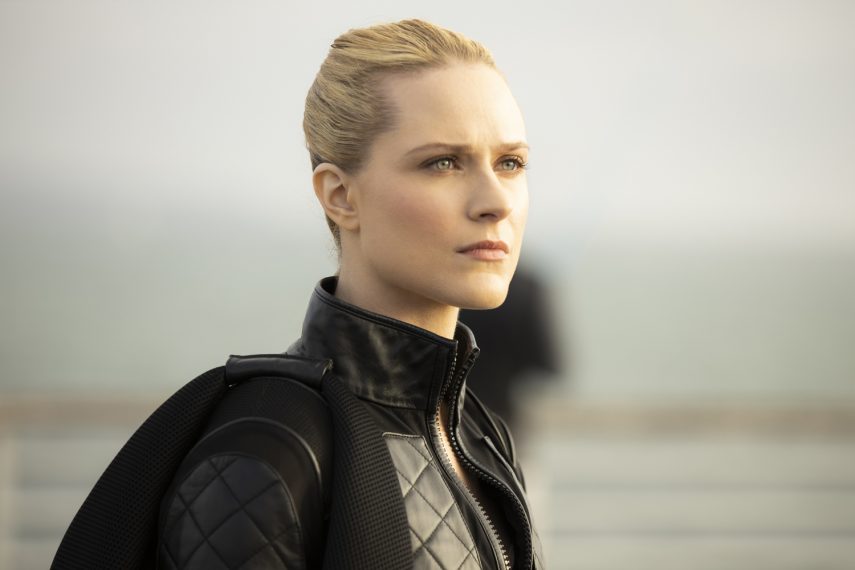
HBO
The more interesting development is Dolores’ seeming ability to create hosts. “The real gods are coming, and they’re very angry,” she warns before having a host version of Connels kill the real Connels. This brings up a whole new bunch of ethical conundrums. Is host Connels sentient like Dolores? The way he was robotically following orders suggests not. And so, does that mean Dolores is — as she said herself — playing god? Has she become what she hates? A one-woman Delos, creating hosts for her own means? It’s a far more fascinating question to consider than “who built the system?” and furthers Dolores’ journey from kindhearted farm girl to the big bad of Westworld.
If there is one person who knows the danger Dolores poses, it’s Bernard (Jeffrey Wright), who appears to be in a self-imposed exile somewhere in China. Months on from the Westworld massacre, which he was blamed for, Bernard is now working in a slaughterhouse under the alias Armand Delgado and living in a tent that looks like it was left over from Fyre Festival. While Dolores is leaning into her host capabilities, Bernard is trying to subdue his violent urges. He’s essentially imprisoned Bernard within himself, though he’s able to switch between personalities with the click of a remote key fob — don’t ask me how.
It’s nice to see Bernard doing something different than thumbing an iPad for once, but his storyline still feels overly complicated and distant. Honestly, it’s hard to keep up with where Bernard is currently at, which I suppose works in a sense, as it puts the audience in Bernard’s mind frame. He’s a character that can’t trust his own memories and never quite knows what is happening or when it’s happening. At one point in this episode, he interrogates himself, asking when the last time Bernard had contact with Dolores. “Would you ever lie to me, Bernard?” he asks. “No,” he replies, but not at all convincingly.
And so, after being exposed and ambushed by two butcher colleagues, Bernard switches onto badass setting, beats them up, hires a boat, and is off to sail the seas in search of Westworld, where no doubt he’ll be reunited with his trusty tablet and a whole lot more confusion. But what kind of Westworld will he be returning to? If Charlotte Hale gets her way, it’ll be back up and running as if nothing ever happened. She tells a boardroom of concerned Delos execs that the assets in the parks are too valuable to lose and vows to resume host production. “Robots don’t kill people, people kill people,” she states, believing the Delos brand can quickly recover from this horrific PR disaster.
Of course, there is more than meets the eye with this situation. Remember, the real Charlotte was killed at the end of season 2? Therefore, the Charlotte we see now is a host, one more than likely created by Dolores. That means that reopening the park is not the order of a greedy corporate executive but part of Dolores’ plan to bring about humanity’s destruction. Could that be exciting? Maybe. Is the host-pretending-to-be-human trope becoming tiresome? It’s certainly pushing its luck. Also, between this, the introduction of Caleb, Dolores’ spy drama, the system, secret architects, plus whatever Bernard is doing, there is already A LOT going on — and this is just the first episode.
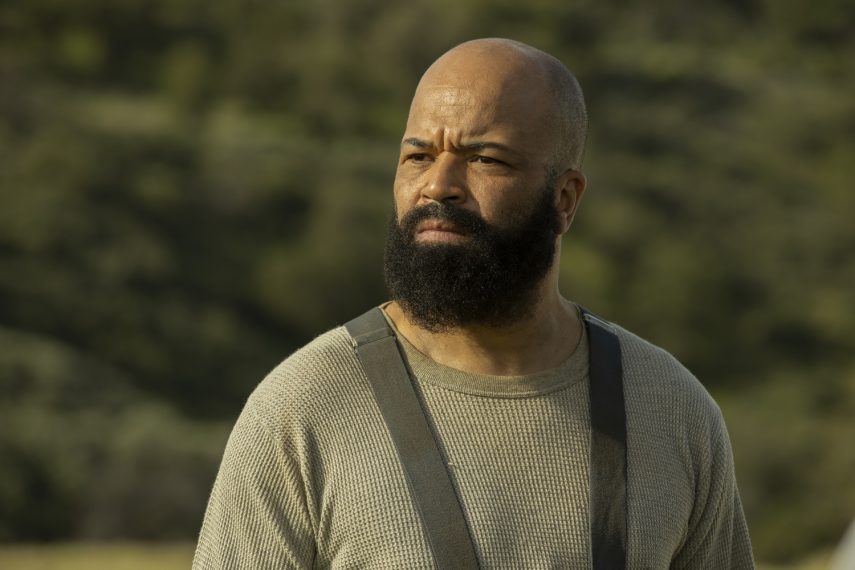
HBO
And all this before we even touch on Maeve (Thandie Newton) and The Man In Black (Ed Harris). The latter isn’t present in this episode, but we know he’s lurking under that black stetson somewhere. Maeve, however, pops up in a surprising post-credits sequence in what appears to be… Nazi Germany World?! It’s an impactful image, one that is kind of tonally jarring to the rest of the episode but at least brings with it some genuine intrigue. And when you think about it, there is a twisted logic to a Nazi World theme park that feels scarily prescient. Maeve has always been the show’s strongest character in my estimation, so I hope this story gives her something to really sink her teeth into.
There is at least some hope here that Westworld can overcome its pitfalls and maximize its positives, because when it wants to be, Westworld can be a great show. You only have to look at episodes like last season’s “The Riddle of the Sphinx” and “Kiksuya” for proof of that. When it focuses on one or two characters and puts emotional depth above algorithms and timeline trickery, it is some of the best TV out there. Only time will tell if this new look Westworld can break the cycle or if it’ll return to the same narrative loop.
Westworld, Sundays, 9/8c, HBO

